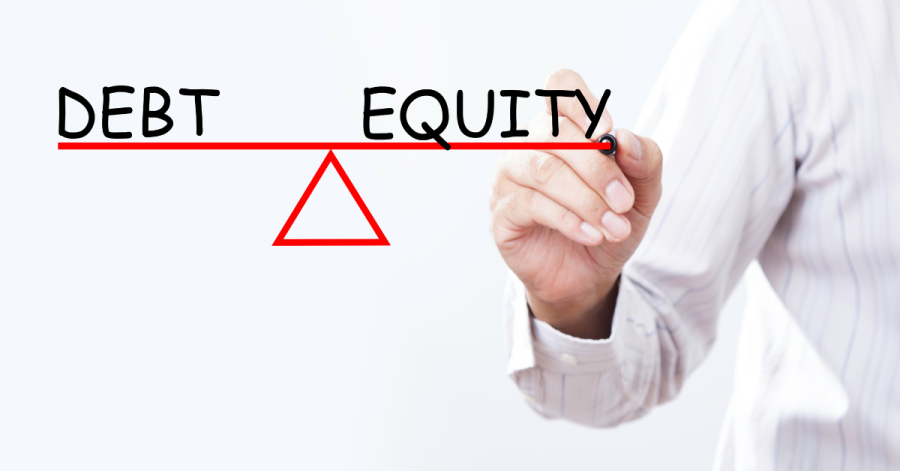Startups often face the choice between debt and equity when seeking funding.
An investor providing equity financing is like a supportive friend who takes a risk for you, offering advice and financial assistance during tough times. They don’t expect repayment, but they do anticipate a full commitment from your side in return.
A lender offering a loan to startups is like a colleague who lends you money when you’re short on cash. They don’t want to hear complaints or offer assistance; they simply expect their money back with interest within a certain timeframe and don’t necessarily seek a personal relationship.
Each funding option has its own advantages and disadvantages for startup founders, so it’s important to consider these factors before making a decision.
Why raise equity
Imagine a startup founder going to a VC firm for investment.
The investor finds the project promising and says, “I’m happy to give you money, and you can use it however you want. You don’t need to pay it back. But, in exchange, I’d like to own 20% of your startup. It’s risky, but I hope that if your business does well, the value of my ownership will increase, and I can make a large profit from it someday.”
VCs invest only in innovative companies with high growth potential, showing little or no interest in traditional businesses. They understand they will likely write off a significant portion of their investment portfolio, and ultimately, only a few deals will generate their main profits.
When founders raise equity funding, they have to give up their most valuable asset in each funding round — shares in their company. If they ever want to buy those shares back, they will likely come at a higher price. This makes equity financing the most expensive type of capital for entrepreneurs.
Another important factor to consider when raising equity is that a VC may become toxic and heavily interfere in the company’s operations. That’s why it’s crucial to get to know your potential partner and document all the details concerning how an investor can influence decision-making in a company.
Despite these drawbacks, equity funding remains the most popular fundraising option, accounting for approximately 90% of the total funding raised by startups. In 2012–2022, startups raised a staggering $3.202 trillion from VCs.
Why is equity funding so popular? Startups can’t rely solely on raising debt, especially in the early stages: they may lack profitability or predictable cash flows, making it almost impossible to get a loan. At the same time, they still need money to support their team, develop the product, and grow.
Startups in capital-intensive industries, such as hardware or biotech, may require significant upfront investments in R&D or manufacturing. For them, raising equity financing can be more beneficial than debt — it allows for larger funding amounts to support their needs.
Another advantage of equity funding is that startups can receive more than just money from VCs — they also gain valuable support and advice.
Why raise debt
Now, imagine a startup founder going to a lender to get a loan.
The lender says, “I can give you money, but I’ll need you to pay me back later with an extra 20%. You can’t use it for R&D, new products or hiring, but you can use it to grow your existing profitable operations. I also might need collateral, and if you can’t fully or partially repay, I may claim something from you.”
This resembles a traditional banking relationship model, with limited risk for the investor. Lenders tend to give money to more stable companies, such as factories or restaurants, offering a loan and expecting the money back with interest.
Some lenders do offer funding to startups, so-called “venture debt.” But they often charge higher interest rates, because startups are considered riskier ventures.
Organizations that provide loans for startups can include traditional banks like JPMorgan Chase, specialized banks focused on startup funding such as SVB, online platforms like Kabbage or Braavo; it can also be government-backed institutions like the Small Business Administration in the U.S. Firms like Hercules Capital or Western Technology Investment offer debt financing options specifically tailored for venture-backed companies.
Debt providers are commonly interested in startups that use the funds as working capital. For instance, neobanks like Leobank and Fibo could borrow money to issue loans to their clients, while Amazon brands aggregator Accel Club could use debt to acquire cash-positive e-commerce brands.
A subscription-based SaaS startup that offers, say, a CRM for businesses is also a suitable candidate for debt funding because such a company usually has contracted recurring revenue from customers.
Many renowned startups like Uber, SpaceX, Netflix, and Amazon have raised debt. In 2020, Airbnb secured $2 billion in debt and equity financing to sustain its operations during the COVID-19 pandemic.
When lending to startups, lenders often include covenant rules in loan agreements. These rules are meant to safeguard the lender’s interests and ensure that the startup fulfills specific obligations during the loan period.
Covenant rules may include requirements such as a specific debt-to-equity ratio in the bank accounts or minimum levels of profitability, limitations on taking on additional debt, and more. In certain situations, founders may even be asked to contribute a portion of their own funds.
Sometimes lenders may restrict the use of their loan to specific needs and prohibit its spending on marketing or PR initiatives, hiring, R&D, or inventory purchases. If the startup fails to meet covenant rules, the creditor may charge a higher interest rate or impose other penalties.
As collateral, creditors may ask for assets such as shares, money owed by customers, property, equipment, etc. If a startup goes bankrupt, creditors are given priority in receiving their compensation, followed by VCs and other equity holders.
Is it worth it for a startup to take on debt? Yes, because it provides cheaper capital compared to equity funding, even though obtaining debt might become more difficult and expensive during downturns and bank failures.
Is it always a good idea? No. It’s a viable funding option if the startup generates enough predictable cash flow to pay interest to a creditor and can adhere to all the covenant rules. If not, it’s better to bootstrap or raise equity instead of accepting unsuitable debt terms.
Why raise a mix of debt and equity
When startups mature and show stability, they may try to raise a mix of equity and debt financing. For instance, our portfolio company Fintech Farm has recently secured a Series B round consisting of equity and a convertible loan (a loan that can be converted into equity at a later stage).
Raising a mix of debt and equity can provide several benefits to startups. First, it allows them to access additional capital beyond what could be obtained through equity funding alone. Debt financing offers funds for specific purposes like business expansion or working capital, while equity funding can provide long-term support for growth.
Additionally, a mix of debt and equity can help diversify the startup’s capital structure, reducing the reliance on a single funding source. At later stages, some companies may need to raise more debt than equity to minimize dilution of ownership.








